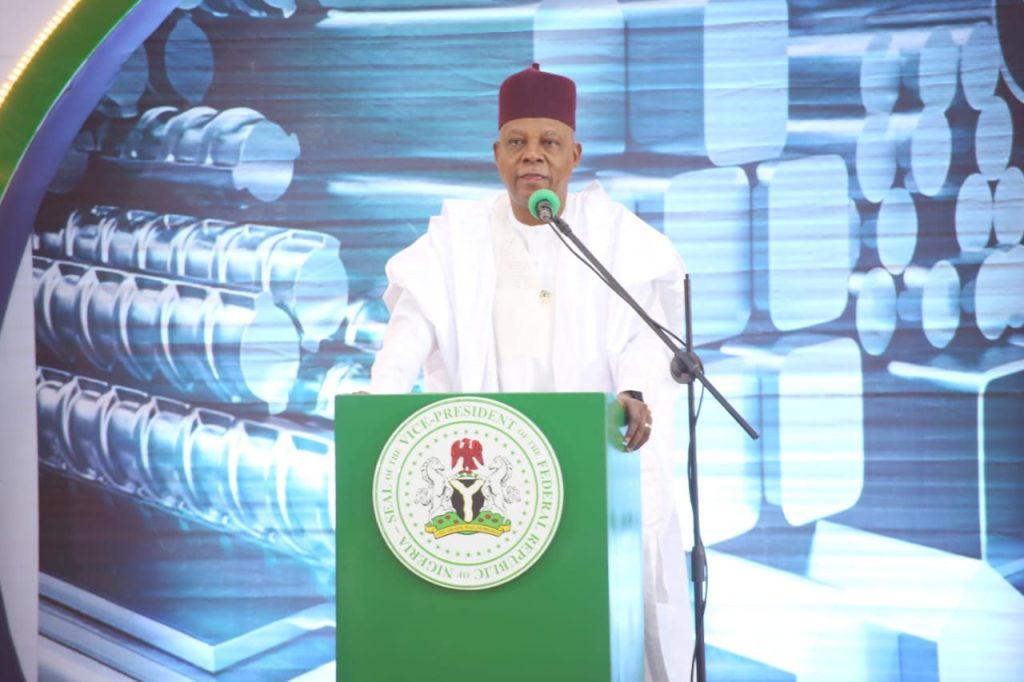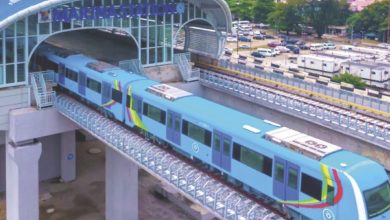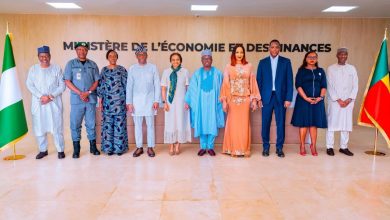FG Unveils Plan to Revive Moribund Steel Plants
The Federal Government has launched a major plan to revive Nigeria’s steel sector after decades of neglect.
The strategy targets Ajaokuta’s operationalization, local production growth, job creation, and reduced dependence on imports.
The Federal Government has rolled out an extensive plan to revitalize Nigeria’s steel sector, more than two decades after a failed privatization program left once-thriving steel plants abandoned and the country heavily reliant on imports. The initiative seeks to restore both government-owned and privatized assets to productive use, positioning them as key drivers of industrialization, job creation, and national economic growth.
President Bola Ahmed Tinubu, represented by Vice President Kashim Shettima, unveiled the strategy on Wednesday at the inaugural National Steel Stakeholders’ Summit in Abuja. Themed “Rebuilding and Consolidating Nigeria’s Steel Industry: Collaborative Action for Sustainable Growth and Global Competitiveness”, the event brought together government officials, industry players, legislators, financiers, and technical experts to chart a new course for the sector.

The president described the revival of the steel industry as a “national imperative,” noting that it is central to building a self-reliant economy. He projected that by 2030, Nigeria could produce 10 million tonnes of liquid steel annually, generate over 500,000 direct and indirect jobs, and significantly reduce the nation’s $4.5 billion yearly expenditure on steel imports.
Tinubu stressed that the industry’s collapse, following the early 2000s privatization of key facilities such as the Oshogbo, Katsina, and Jos rolling mills, the Delta Steel Company, and the Aluminium Smelter Company of Nigeria, had left the country exposed to global market shocks. These plants, now moribund, failed under private ownership, forcing Nigeria to depend almost entirely on imported steel.
The president singled out the Ajaokuta Steel Company once envisioned as the centerpiece of Nigeria’s industrial revolution as a stark example of “abandoned ambition.” Despite abundant local reserves of iron ore, limestone, and coal, he noted that over 90% of steel used in the country is imported. This, he argued, is not merely an economic shortfall but also a threat to sovereignty, given steel’s role in defense, infrastructure, and manufacturing.
Ajaokuta and Key Revival Targets
Central to the government’s plan is the operationalization of the Ajaokuta Steel Company Limited and the National Iron Ore Mining Company in Itakpe. A comprehensive technical and financial audit of Ajaokuta approved by the Bureau of Public Procurement has commenced to determine its current condition before selecting a core investor. The government is weighing strategic partnerships with both Russia and China, with a final decision expected soon.
In addition to Ajaokuta, Shettima revealed that the Delta Steel Company, now operated by Premium Steel & Mines Limited, will undergo rehabilitation within 18 months, subject to raw material availability. The government has also signed agreements with partners in China and other countries for collaboration in mining and steel processing.
To diversify the sector’s capabilities, five mini-LNG plants valued at over $500 million are being constructed in Ajaokuta in partnership with NNPC Limited and private investors. These facilities will support planned projects such as a military hardware production line in collaboration with the Ministry of Defence, an industrial park, a free trade zone, and a gas park.
The government is also pursuing the revival of the Aluminium Smelter Company of Nigeria in Akwa Ibom under a $465 million proposal, as well as the development of a $400 million Stellar Steel plant in Ogun State to produce hot-rolled coils and plates.
Incentives and Policy Reforms
Minister of Steel Development, Prince Audu Abubakar, outlined an updated 10-year roadmap targeting the production of 10 million metric tonnes of crude steel annually. The plan includes fiscal incentives such as up to 95% capital allowances, duty-free importation of equipment, and tax holidays for investors.
To boost local participation and ensure raw material availability, the government has banned the export of metal scraps, improved ease of doing business measures, and introduced a scrap aggregation policy. This policy will establish collection centres in all six geopolitical zones starting with the Southwest to regulate recycling, reduce infrastructure vandalism, and maintain a steady supply of materials for steelmaking.
Abubakar stressed that revitalizing local steel production will not only save the country billions in foreign exchange but also strengthen its position as a regional steel hub. He further revealed that 30% of steel inputs for government projects will be sourced locally, creating consistent demand for domestic producers.
Legislative and Strategic Support
Chairman of the Senate Committee on Steel Development, Senator Patrick Ndubueze, pledged full legislative backing for the revival drive. He criticized past wholesale concession arrangements that failed to yield results and advocated for unbundling the Ajaokuta complex into independently operated units. He noted that over 20 of the plant’s 38 completed factories could function if central utilities were restored and leased to credible Nigerian or vetted foreign operators.
Integration with Mineral Development
Minister of Solid Minerals Development, Dr. Dele Alake, tied the steel sector revival to broader mineral development efforts. He announced the imminent commissioning of a $600 million lithium processing plant near the Kaduna-Niger border and a $200 million refinery near Abuja, with two additional plants in Nasarawa set to become operational by the end of 2025.
Alake highlighted Nigeria’s leadership in continental mineral strategy through the Nigeria Solid Minerals Company and the African Mineral Strategy Group. He reported that over 2,350 mining marshals have been deployed nationwide, more than 300 illegal operators arrested, and over 20 convictions secured. He urged stakeholders to embrace a cluster-based model integrating mining, processing, and manufacturing to ensure competitiveness and sustainability.
A Defining Moment for Industrialization
Both Shettima and Abubakar framed the summit as a pivotal step toward realizing President Tinubu’s Renewed Hope Agenda and the goal of achieving a $1 trillion economy by 2030. They argued that steel is not just an industrial input but the foundation of a modern economy, underpinning infrastructure, energy, defence, and manufacturing.
By combining infrastructure investment, regulatory reform, fiscal incentives, and public-private partnerships, the administration hopes to revive an industry long seen as Nigeria’s best chance at industrial self-sufficiency. With clear timelines, targeted projects, and international collaboration, the government is aiming to turn decades of missed opportunities into a sustainable engine of economic growth.
If the plan succeeds, Nigeria could finally unlock the potential of its vast mineral resources, reduce its reliance on imports, and position itself as a leading steel producer in Africa fulfilling the promise envisioned when the first foundations of Ajaokuta were laid.



